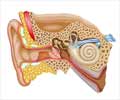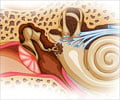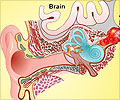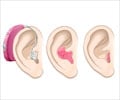A revolutionary biodegradable pellet has been developed by The University of Nottingham scientists that could transfer the lives of thousands of children who suffer from glue ear.

Glue ear happens when thick mucus collects inside the ear, at the other side of the eardrum. This interferes with hearing and therefore with schooling, social development and relationships with friends and siblings. Following research has now recognised that glue ear is caused by biofilms - bacteria which grow together in a protective 'slime'. They are very difficult to treat because they are capable of turning off target sites for common antibiotics, becoming up to 1,000 times less susceptible. In a significant proportion of cases, antibiotics have only a temporary effect and repeated grommet operations are needed.
Dr Mat Daniel said: "We tested antibiotics against biofilms in the laboratory but it rapidly became apparent that very much higher levels of antibiotics would be needed. Because of that we knew that giving antibiotics by mouth was not going to work. We developed this biodegradable antibiotic pellet so we could put it directly into the ear - where the actual infection is. We hope that in the future this may very much reduce the need for any children to have more than one operation."
Source-ANI














